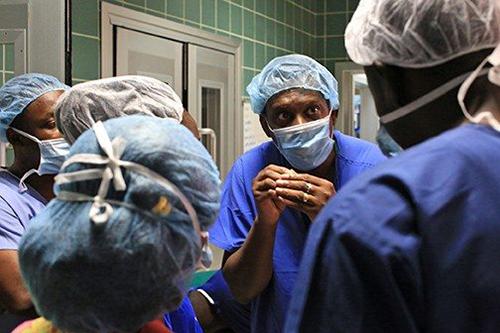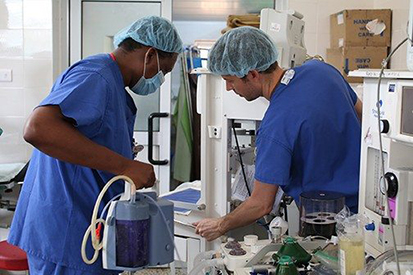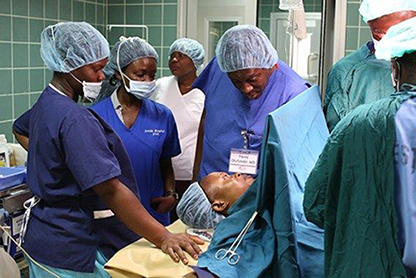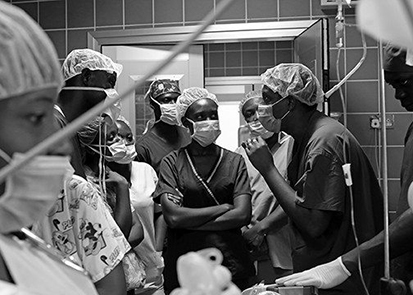
One of Adeyemi “Yemi” Olufolabi’s, MB BS, fondest memories while working in the operating room at Ridge Hospital in Ghana was of a patient who came there in labor. She was in severe pain. Along with Holly Muir, MD, and the rest of the Duke Global Health team, Dr. Olufolabi gave her analgesia, relieved her pain, and safely delivered the baby. Dr. Olufolabi recounted how the patient kept in touch with him and expressed gratefulness to the team for the smooth delivery of her baby. A few years later, the woman had another child at a different hospital. With few healthcare workers and resources available, she did not receive the same level of attention and pain relief during delivery. Drawing a sharp contrast in the quality of care she received there, she told Dr. Olufolabi emotionally how she hoped that everyone in Ghana could have access to the type of care that she received at Ridge Hospital.
Global Health Updates – Ghana

Since 2005, Drs. Olufolabi and Muir, along with other current and former doctors at Duke (Drs. Ashraf Habib, Terrence Allen, Evelyn Lockhart, and John Schultz) have been taking multi-disciplinary teams to Turkey, Croatia, Republic of Georgia, Egypt, Armenia, Haiti, Uganda, Nigeria, and Ghana. The team members include nurse anesthetists (CRNAs), obstetricians, neonatologists, residents, and others interested in improving maternal care on a global scale. Most recently, Duke Anesthesiology’s presence has been particularly strong in Ghana. Duke has partnered with Kybele, a non-profit organization founded by an anesthesiologist, Medge Owen, MD, at Wake Forest University. Kybele’s mission is to improve birthing conditions and outcomes for babies worldwide by providing training and resources to host countries. Consequently, Drs. Olufolabi and Muir have seen their efforts in Ghana bear tremendous results, impacting the lives of both patients and healthcare workers there.
A Rising Demand in Ghana

“At Ridge Hospital in Ghana there are 11,000 child deliveries annually, up from 4,000 in 2005, with only 3 anesthesia attendings available. At Duke, there are approximately 3,000 child deliveries annually with 8 attendings. The fundamental difference is the sheer number of births and few healthcare workers,” Dr. Olufolabi explains. With the rising number of deliveries at Ridge Hospital and few attending physicians present, well qualified CRNAs and midwives have to fill in the gap in providing quality care. To meet this growing demand, Drs. Olufolabi and Muir helped create a Bachelor’s degree program for CRNAs in Northern Ghana to provide a career pathway for qualified nurse anesthetists. Eventually, they would like to implement a Master’s Degree program for CRNAs as well.
They have also seen the graduation of the fourth class of nurse anesthetists from the Nurse Anesthetist School at Ridge Regional Hospital. Before the implementation of this school, Ghana had approximately 500 nurse anesthetists. Now, with nearly 100 new nurse anesthetist graduates, they have been able to increase the capacity for those delivering safe anesthesia.
Drs. Muir and Olufolabi have been providing additional, on-going training and leadership programs to keep healthcare workers engaged and informed throughout their careers. Besides holding courses that focus on performing safe and efficient Caesarean sections, they have held two airway courses for CRNAs, a high-risk procedure course, and continuous skill improvement sessions.
Healthcare workers in Ghana appreciate the efforts of the Duke team. Recalling an airway course in January 2012, Dr. Muir says: “After the first class of 120 participants graduated from the CRNA program, I bought finger pulse oximeters for all of them. A number of students came to the airway course the following year, and told me, ‘I still have my pulse oximeter and it’s the best gift you could have given us. We go to places that don’t have any monitors.’ They are so grateful to become well-qualified CRNAs.”
To help their colleagues in Ghana, who have access to minimal resources, the CRNAs and student CRNAs at Duke have followed Dr. Muir’s lead and launched a drive to collect disposable items, including finger pulse oximeters, to send to Ridge Hospital.
A New Maternity Operating Room

Drs. Olufolabi and Muir have also been successful in opening a dedicated maternity operating room at Ridge Hospital through collaboration with Kybele, Ridge Hospital, the Ghana’s Woman’s Club (a group of educated women who came together to make a difference in Ghana), and the United States Agency for International Development (USAID).
Originally, Ridge Hospital had four, shared operating rooms (ORs). Women in need of emergency Caesarean sections had to often wait for an OR to become available. With a dedicated maternity OR, doctors and nurses can now safely care for the large number of cases that come in. According to Dr. Olufolabi, since the team from Duke began their work at Ridge Hospital, the rate of mortality and stillbirths has decreased (stillbirths by 50% at one point), despite the rising delivery rate.
An advanced computer system has been set up in the new maternity suite and the OR to collect data. The data from the labor ward is used for presentations both for the stakeholders as well as government officials who control funding.
Dr. Olufolabi explains: “Each visit has one major conference where all the stakeholders come, where we present what we’ve done and where we’re going, so that there is a buy-in of the progress from local stakeholders.”
The Future of Global Health
Residents have also been involved in the department’s global health endeavors in Ghana. Dr. Olufolabi, who spent January of 2014 with a resident from Duke, explains: “The residents at Duke are keen in supporting and being a part of the global community. There is definitely a growing interest among our trainees to make a difference in the global community, and they recognize that this is an important contribution being made by the department that must be sustained and developed further.” Duke Anesthesiology has partnered with the Duke Global Health Institute to develop a two-year Global Health Fellowship. Those accepted into the program will have the opportunity to spend one year of fellowship in the field, and one year at Duke. The fellowship will enable fellows to make valuable contributions to medical care in underdeveloped countries as well as earn their Master’s Degree in global health. To get more information on the global health efforts at Duke and to learn more about the Anesthesiology Global Health Fellowship, please visit us online at: www.dukeglobalhealth.org.